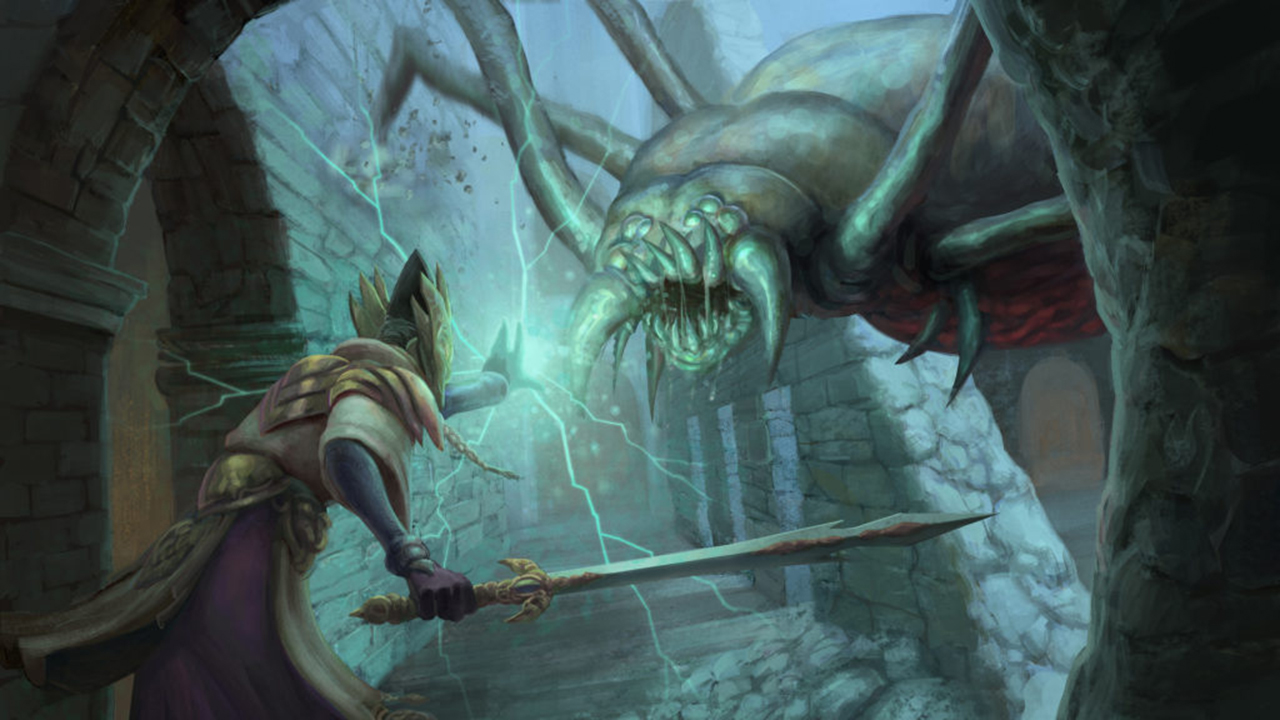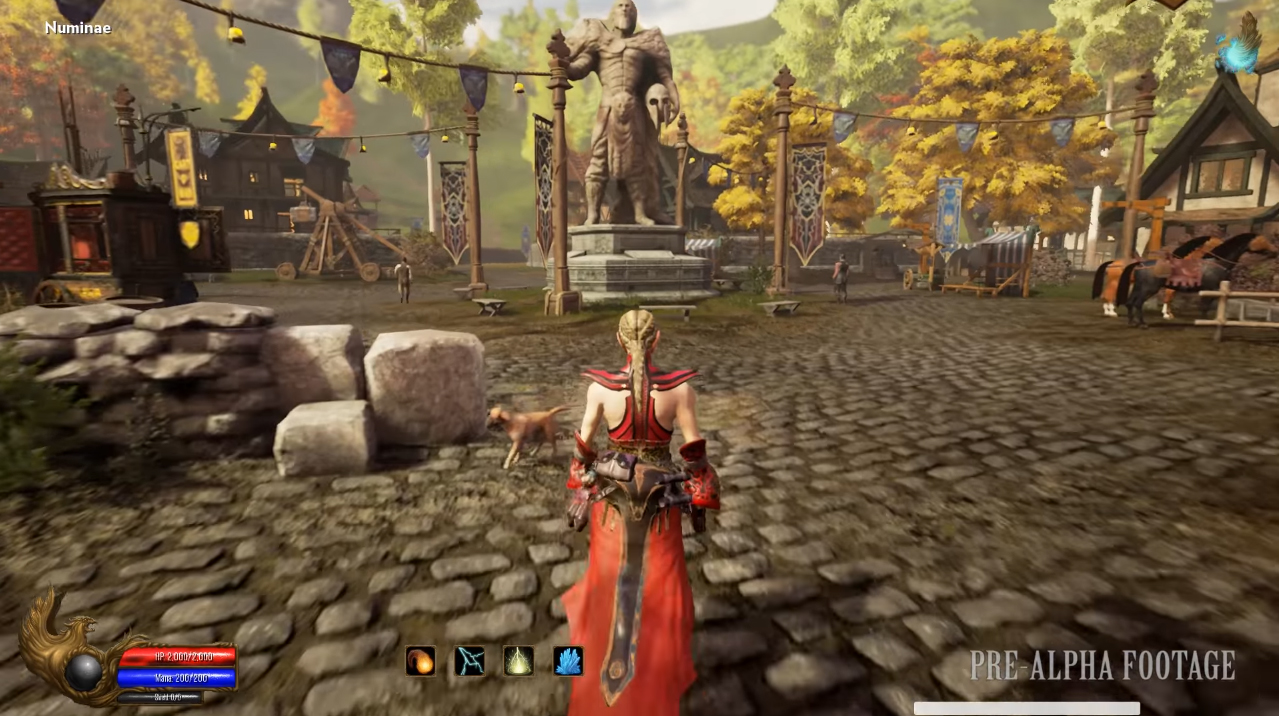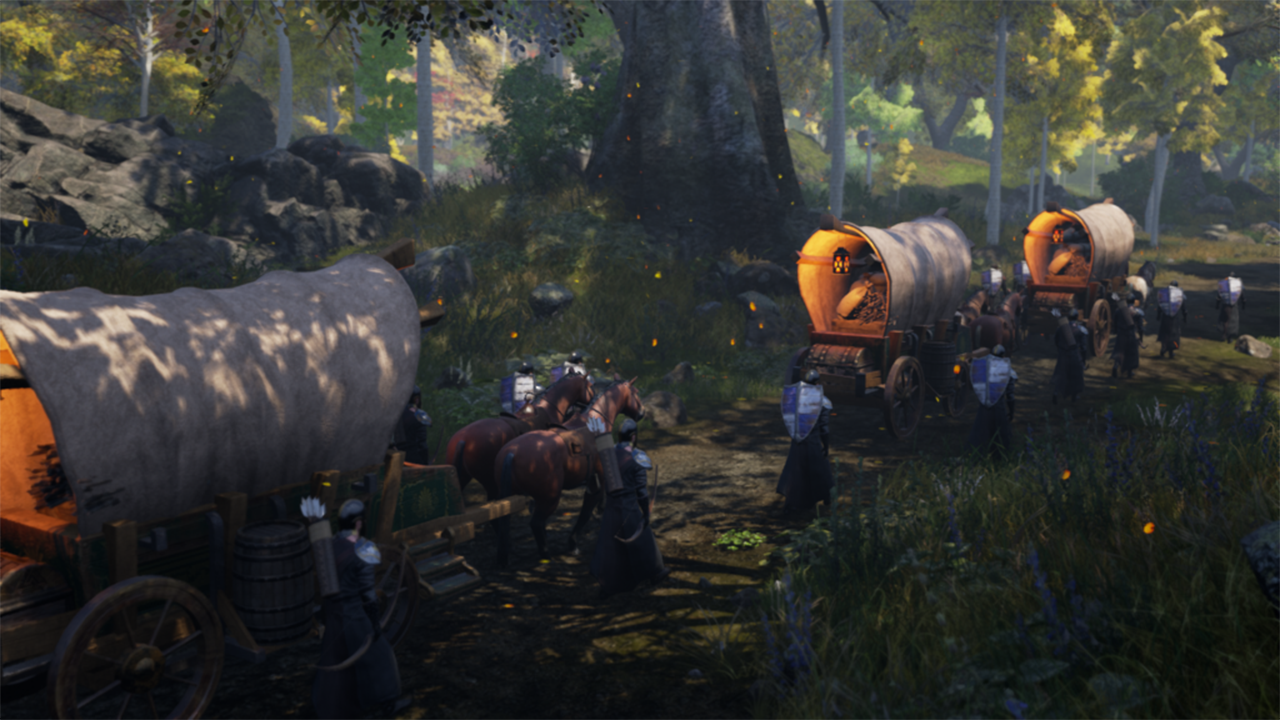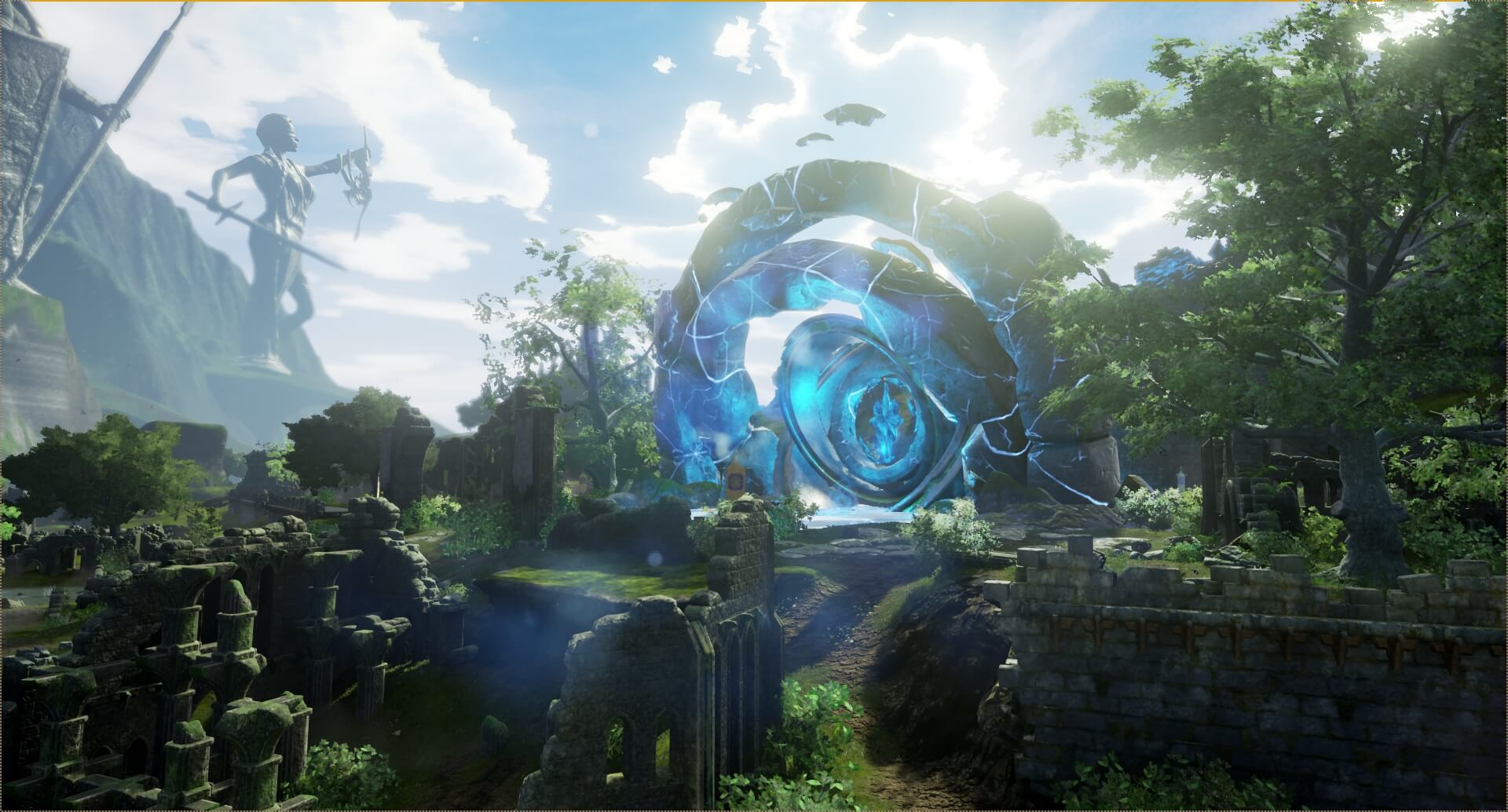There's something strange about Kickstarter's most successful MMO
A look into Ashes of Creation's history, contentious referral program, and more.

Update, 2 June:
After this report was published last week, we received conflicting accounts regarding Ashes of Creation’s referral program and whether or not it included donations received through Kickstarter. As the original story states, a Kickstarter spokesperson told us that this was against their rules and that Kickstarter had informed Intrepid Studios, who had complied by removing Kickstarter pledges from the referral program.
Intrepid Studios’ Steven Sharif then released this statement via MMORPG.com’s forums, asserting that our reporting was false. As Sharif’s statement directly conflicted with what Kickstarter initially told me, I followed up with Kickstarter. This was the response, which confirms our initial reporting as accurate, but also acknowledges that Intrepid Studios did not remove Kickstarter pledges from the referral program:
“The information I gave you is accurate, except, as I recently learned, the part where I said that this creator had excluded Kickstarter pledges from their referral program,” Kickstarter’s director of communications, David Gallagher, told me in an email. “[Intrepid Studios] told us that Kickstarter pledges would be removed from the program, making it entirely separate from the Kickstarter project, which we saw as an acceptable solution. It appears that this did not happen. [Intrepid Studios] said this week that based on [their] communication with us, [they] believed it was fine to continue to include pledges. That was not correct.”
Despite the Ashes of Creation Kickstarter being in breach of Kickstarter’s policies, Gallagher informed me that they will not be taking any action against the campaign. “Given the potential for misinterpretation, the creator's removal of the reference to pledge referrals on [their] own site, and the fact that the Kickstarter project page did not mention the referral program, our Integrity Team has decided not to take any action against this project. We'll be revisiting the way we communicate our rules around referral programs to make sure our policies are clear to creators going forward.”
Original story:
Earlier this month, Ashes of Creation exploded onto Kickstarter with one of the most successful campaigns in years, raising more than 2.3 million dollars. The MMO promises to "breathe new life" into the genre thanks to an innovative design that marries the structured storytelling of games like World of Warcraft with an open world that evolves according to the decisions of its players. As PC Gamer's resident MMO expert, there's a lot about Ashes of Creation that piques my interest.
Perhaps the defining feature of Ashes of Creation is its malleable world. Over the course of years, a village might grow into a town and then a city as players in the surrounding area complete quests and invest in the local economy. But the world also has ways of pushing back. Special events can trigger, like a dragon emerging from a nearby volcano to siege a city, and players will need to decide whether to rally and fight or rebuild elsewhere. All of this will happen dynamically and each server will tell its own story.
It's a bold and exciting idea. But looking closer at the crowdfunding campaign, I also had concerns about the game’s unusual referral program and the history of the company making it—and after sifting through posts on various MMO-related subreddits, I wasn't alone.
Keep up to date with the most important stories and the best deals, as picked by the PC Gamer team.
As always, it's imperative that we treat any Kickstarter campaign with a healthy amount of skepticism. For many concerned gamers, Ashes of Creation warrants extra scrutiny. I spoke with Steven Sharif, creative director and founder of Intrepid Studios, and Jeffrey Bard, lead game designer, to take a deeper look into Ashes of Creation and talk about its Kickstarter campaign, the studio's history, and Ashes' contentious referral program.
The origins of Ashes
Ashes of Creation’s quest to reinvent the MMO genre apparently resonated with a large audience. Within a day, the campaign reached its goal of raising $750,000 and continues to cleave through its stretch goals.
To put that in perspective, consider that legendary designer Richard Garriott's Kickstarter MMO Shroud of the Avatar only managed to raise $410,861 on its first day. Castlevania creator Koji Igarashi's Bloodstained: Ritual of the Night secured just shy of a million dollars on day one, and it's the second most-funded videogame Kickstarter of all time.
Ashes of Creation is well on its way to joining Bloodstained, and it's doing so without the popularity of a well-known designer or brand to carry it. In fact, this will be Sharif's first foray into making videogames.
Understandably, that’s raised a few eyebrows.
Ashes of Creation's huge success isn't the only thing that's unique about it. Outside of the Kickstarter campaign, the entirety of its funding is coming from Sharif's own pockets. His status as a wealthy entrepreneur has already been the subject of debate in the community, so much so that Sharif has had to personally clear the air.
As he disclosed in a post on the Ashes of Creation subreddit, Sharif made a fortune at a young age thanks to selling nutritional drinks and eventually became involved with XanGo, a well-known multi-level marketing company that sells a host of wellness juices and supplements. Eventually he went on to become involved in investments and real estate, which he attributes to "the source of a majority of [his] success."
The multi-level marketing industry is one embroiled in controversy and skepticism (this feature by talk show host John Oliver argues why), but Sharif is funneling his past success into building something new: his dream MMO. "When I decided to start Intrepid Studios," he tells me over Skype, "I did it out of a love of the genre and not liking where it's been going for the past several years."
He tells me he founded the company and began reaching out to friends of his in the gaming industry looking for talent he could recruit. Around that time, Sony Online Entertainment was sold off and became Daybreak Games, and as part of the transition several of its employees had left the company for one reason or another. That's how Sharif came into contact with Jeffrey Bard and the other MMO developers who would form the core team behind Ashes of Creation.
But why turn to Kickstarter? "Crowdfunding also allows us to connect directly with the players most invested in our success," the campaign page reads. "We need your voices to help grow this community, and to keep us accountable to those who matter most, the players."
"The entirety of the budget comes from my personal funding."
Steven Sharif
Speaking directly with Sharif, he explains further. "Kickstarter is a very small supplemental source to increase the scope of our project and hire additional personnel."
Something that certainly caught my eye was the promise that if, for any reason, Sharif believes Ashes of Creation won't launch, he'd refund every donation in full. I was skeptical of such a claim seeing as that Kickstarter money would already be spent on salaries and development by the time the game failed. "The entirety of the budget comes from my personal funding," Sharif says. "So if there's ever a moment in the future where it looks like there's a small percentage that this project might not be done, those reserves are available to refund the people who pledged towards it."
Simply put, Sharif is willing to pay people back personally if Ashes of Creation fails.
But don't go funding the game just because you'll get your money back if it doesn't work out. Kickstarter itself guarantees no refunds, and, cynically speaking, Sharif's promise isn't necessarily legally binding and is ultimately meant to be taken on good faith. As with any Kickstarter project, you should approach with caution. If you decide to donate, do so knowing that your money could disappear—just hope you get a cool MMO out of it.
[Editor's note: the preceding sentence was altered for clarity on June 2nd, 2017]

New blood
There's another angle to consider, however. Crowdfunding is inherently full of serious risks even with highly experienced developers behind the wheel. Tim Schafer's Broken Age was, by all accounts, a complete mess that went over budget, was delayed years, and even resulted in the game being split into two parts. Fortunately, the final game was still pretty good. If only the same could be said for Keiji Inafune's Mighty No. 9.
If some of our industry's most respected developers walk away from crowdfunding campaigns with more than a few bruises, can Intrepid Studios weather the blows? While Sharif has no experience in developing games, he touts his "25 years of experience" as a player of said MMOs and a team with "over 40 years of MMO experience" including working projects like Star Wars Galaxies, Everquest, and Planetside.
Despite those impressive numbers, I wouldn't blame you if no one's name at Intrepid Studios rang any bells. Lead game designer Jeffrey Bard, for example, was an Everquest 2 game designer at Sony Online Entertainment for just under three years. Before that, he was a senior supervisor of customer support. It's not my intention to question anyone's expertise, but rather highlight that Intrepid Studios' unique circumstances come with their own risks. But according to Sharif, that's exactly their strength.
"I have no experience in the industry. But I have experience running a business and I have experience in marketing."
Steven Sharif
"I have no experience in the industry," Sharif admits. "But I have experience running a business and I have experience in marketing. All of those things combined, I know that in order to be successful in any industry you have to be willing to listen, take advice, and rely on the experience of others who are experts. When I formed the studio, I made sure when bringing team members on that they were people that had extensive experience in the industry and could share that vision with me so I could rely on that experience."

Sharif explains that, being an avid MMO player for so many years, he has an "outsider's" perspective that aligns him closer with what players actually want. That's partially why Intrepid Studios is so adamant on the game requiring a subscription fee to avoid pay-to-win features that have commonly cropped up in modern free-to-play MMOs.
It's certainly a perspective I can see value in, and having some new blood pushing the genre forward is something I'd absolutely love to see. However, crowdfunded games have a reputation for not delivering on their promises. While there's no denying Ashes of Creation has cool ideas, there’s also very little proof those ideas will ever coalesce into a proper game. During my interview with Sharif and Bard, they used screensharing software to show me some of the game. I was hoping to get an inside look at Ashes' node system, easily the most unique design that fuels the entire game.
On paper, the node system allows environments to react to players' actions and helps create a world that feels dynamic and alive. For example, as players complete quests, kill monsters, and do all the typical stuff you do in an MMO, the area they are in will also level up. Over time, a small camp might become a village, and, eventually, a thriving city.
Unfortunately, none of this could be shown to me in real-time. Some features simply aren't implemented, and as Bard admits, the system is so grand in scale—a node becoming a city could take months or years—that they haven't figured out how to demonstrate it in a single sitting.
While the feature doesn't exist in any current MMO, it's not exactly groundbreaking. Black Desert Online, for example, has its own kind of node system that players interact with. Ashes of Creation appears to just take it one step further by letting players' decisions have a deeper, more apparent impact.
"We're just rearranging the pieces into something new that hasn't really been done," Sharif says.
"These cities are not created procedurally, they're basically templates based on the environment around them," Bard explains. "It's a little bit of us and a little bit of the players."
In theory, it's a very exciting design. But all games live and die by according to the execution of those designs, and right now, despite how I might enjoy the vision the team has, there's too little to show. I suspect it'll be years or more before we start seeing the pieces fall together and something coherent begin to take shape.
Word of mouth
Perhaps the most controversial aspect of Ashes of Creation has been its referral program. The program has changed significantly since the Kickstarter began. Now, through the game’s website, players can give referral codes to friends and any money they spend on microstransactions or a subscription fee (Ashes has no box price) will earn the referrer 15 percent of that value back as premium credits or actual cash when the game is live. While other games have had similar incentives, offering actual money as a reward appears to be the first—if not the most popular—implementation of this type of program. And you don’t even need to have invested any money into the game to get a referral code.
The referral program actively incentivized people to hype up and spread word about a game that doesn't exist.
From a marketing standpoint, it's hard not to see the strength of such a system. But my real concern was that initially the program included money spent on Kickstarter pledges. The referral program actively incentivized people to hype up and spread word about a game that doesn't exist and, considering how volatile crowdfunding development can be, might never exist. Already there are dozens of YouTube videos talking about the game in terms like "Amazing new MMORPG" and "5 Reasons to be Hyped…" with links to referral codes. An earlier version of the referral program's webpage (which no longer exists) estimated that YouTubers could pull in tens of thousands of dollars by talking about the game—keeping in mind those referral codes are given to anyone who registers an account for free, not just those who aim to play the game.

I reached out to Kickstarter to see what their policy is on the matter. "Last year we began allowing financial incentives for referrals," they responded. "But we do not allow revenue or profit sharing, which this program essentially offers through its payouts over time."
In response to PC Gamer's inquiry, Kickstarter told me they've informed Intrepid Studios, which has removed Kickstarter pledges from its referral program. Since then, Intrepid Studios has significantly updated their referral program page to reflect these changes and has removed examples of how much money YouTubers could hope to make. They’ve also specified that the cash that people can earn from the referral program will be paid out quarterly after the game has launched.
Citing Sharif's multi-level marketing background, some commenters have labelled the referral program a pyramid scheme or even suggested the whole Kickstarter is an elaborate scam. While I still have reservations about this kind of program, it most certainly isn't a pyramid scheme.
In a classic pyramid scheme, one person signs on three other people as a distributor of the product and earns a percentage of their income. Those people then sign on another three people each and earn a portion of their income, which, in turn, has a share taken out and sent to the person at the top of the pyramid. The more people involved in the scheme, the more money those at the top make.
However, as Sharif explains, Ashes of Creation's referral program works in exactly the opposite manner. "If you refer someone who spends $15 to play our game, you are rewarded with $2.25," he wrote in a Reddit post breaking down the math. "If they refer someone who spends $15 to play our game, they now only spend $12.75, which means you are now only rewarded with $1.91."
The more people in your referral network, the less you make—that is assuming the money you make in the referral program is funneled back into the game. For example, if I refer someone who then refers several people and eventually reduces their in-game subscription expense to zero (and doesn’t buy any other microtransaction items), I no longer make money from them.
Extrapolating this out, if I refer three people who each pay the full subscription fee of $15 a month, I would make a total of $6.75 a month from the referral program. But if each of those people in turn refer three people and then use that money to lower their subscription fee (instead of just keeping it), I’d only make $3.71 from my referrals.
"I understood how projects of this size go to market, they have a large marketing arm and they have to devote a large amount of their resources or find a publisher willing to do that to market the game," Sharif explains. "For me, it didn't make much sense in the MMO-specific genre—something that is so close knit as a group of people, you know, guild-oriented, forum-registered... It just didn't make sense that they were doing all of the work in bringing people to a game to not benefit in any way from it. I figured it'd be a good idea to take whatever the company was going to allocate towards marketing and instead incentivize players to spread the word, something that they naturally do."
Sharif tells me his intention was never to create a system to incentivize disingenuous positive publicity from large YouTube or Twitch personalities. "Those types of 'influencers' that have that audience, they're already incentivized by companies that are coming to market with a new product to speak positively of it," Sharif argues. "Usually that comes in the form of sponsorship or royalty deals on people that they bring to the game that can be tracked through different metrics. What this does is that it moves that specific application from the influencers and gives it to the 'little people' as well. It gives it to people who have friends in guilds they want to refer."
Regardless of his intent, there’s no denying the potential consequences. While the "little people" probably won’t make much money using the referral program, those with a large audience absolutely can. As a result of Kickstarter enforcing its rules, the referral program is essentially useless since it no longer capitalizes on pledges through crowdfunding. There’s no way to spend money on Ashes of Creation at this time. But, as is pretty common with crowdfunded MMOs, it’s possible the program could be included in Early Access or other types of pre-release funding models. Meaning that, once again, people would be financially incentivized to spread word of a game that doesn’t exist or isn’t complete. That said, my time spent speaking with Sharif gave me the genuine impression that he's just someone with the resources to try to build his dream MMO.
But I still can't shake my skepticism that Ashes of Creation will be able to escape the pitfalls of Kickstarter while simultaneously pushing the MMO genre forward. It's an enormous challenge, and one where much safer bets like Garriott's Shroud of the Avatar and McQuaid's Pantheon: Rise of the Fallen have arguably failed. I see Sharif and Intrepid Studios as a kind of wildcard approach. There’s potential for something great, but the risks feel greater too. Anyone thinking of supporting Ashes of Creation prior to launch, whether through Kickstarter or any other means, should think carefully before proceeding.
With over 7 years of experience with in-depth feature reporting, Steven's mission is to chronicle the fascinating ways that games intersect our lives. Whether it's colossal in-game wars in an MMO, or long-haul truckers who turn to games to protect them from the loneliness of the open road, Steven tries to unearth PC gaming's greatest untold stories. His love of PC gaming started extremely early. Without money to spend, he spent an entire day watching the progress bar on a 25mb download of the Heroes of Might and Magic 2 demo that he then played for at least a hundred hours. It was a good demo.


